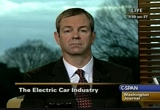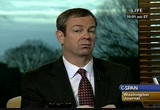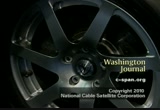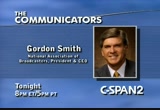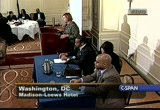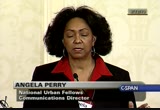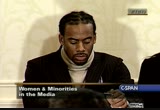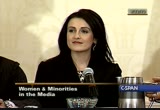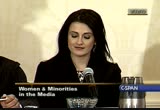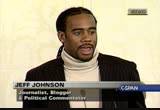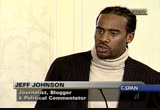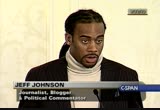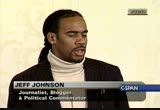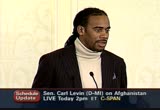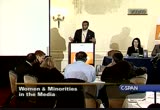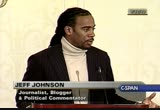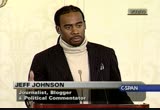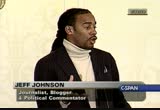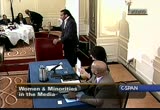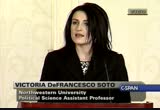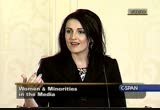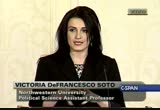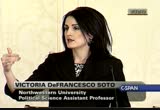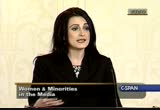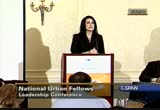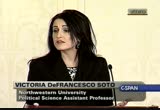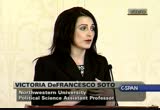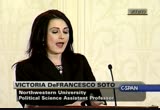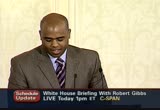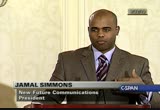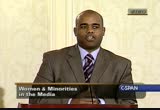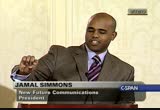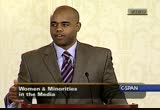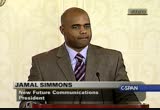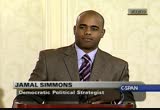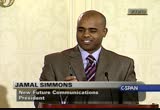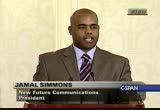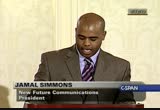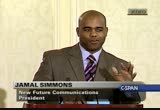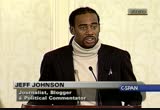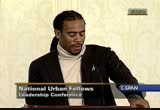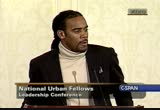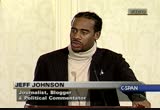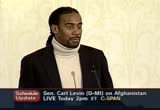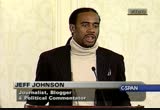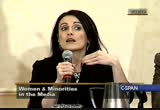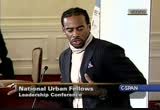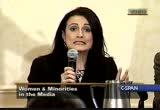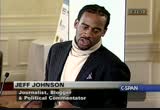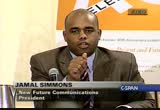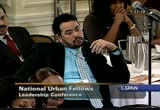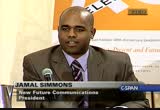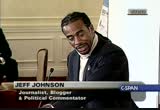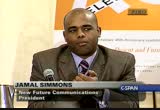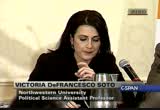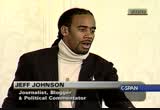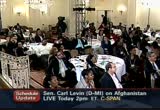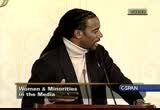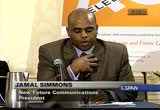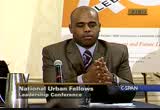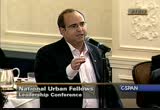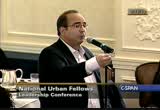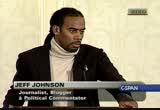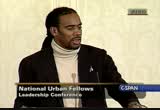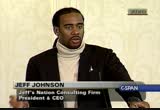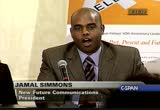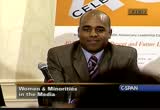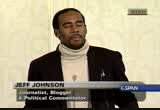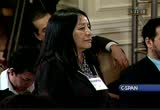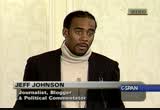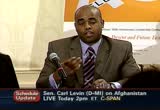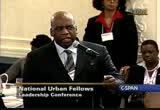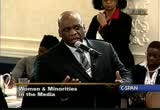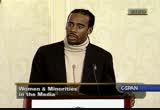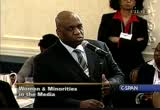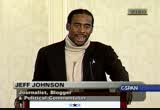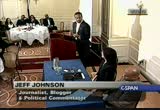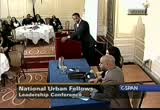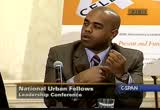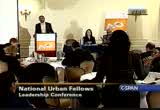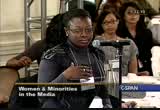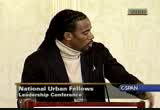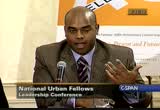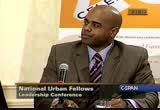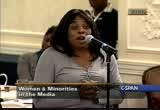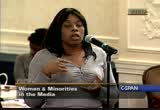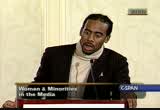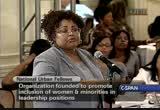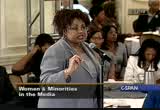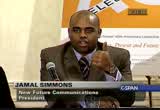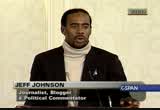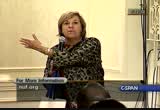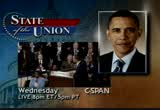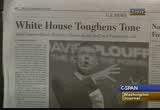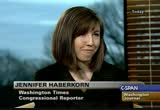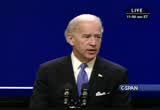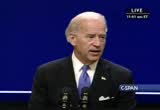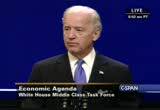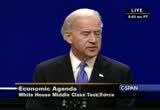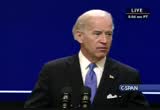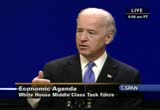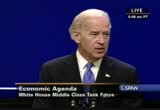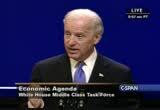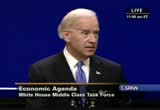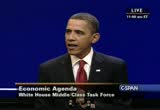tv Today in Washington CSPAN January 25, 2010 10:00am-12:00pm EST
10:00 am
save lives. my point is, getting congressman andy national transportation safety administration -- and at the national transportation safety administration to focus on these&4k vehicles, which woud mean even more gas mileage in the future, we would need to reduce our speeds and still be able to keep up our safety standards. these electric vehicles, they would have a tough time moving around with some of the docile -- faster moving vehicles on the road. can you tell us how much you think the oil industry, who is so powerful -- and i know we do not want to put a lot more americans out of work in this tough time in our economy, but we need to get off of foreign oil. host: you get the last word.
10:01 am
go ahead. guest: he is right. we need to do what we need to do we need to do it again -- and doing it in a way that is sustainable. that is why talk about an electric vehicles and we ought to get our transportation structure holistic way. if people slowed down and started to get out of -- people slowed down and started to get out of their vehicles when the price of gasoline went up to $4 and i think they will again. i think people will begin to respond to this and get very concerned with safety. they get concerned about land use. these are moving closer to where they work. electric drive to place some strength. the we have the ability to meet these applications today. the we are just trying to ramp up manufacturing to meet expectations going forward. host: you can take a look at
10:02 am
their website. thanks for joining us. that will do it for "washington journal" on this monday morning. we're back tomorrow morning as usual at 7:00 a.m. eastern. we will see you then. [captioning performed by national captioning institute] [captions copyright national cable satellite corp. 2010] . . ah
10:03 am
>> reporters may ask white house spokesman robert gibbs about these issues, and we will have live coverage at today's white house briefing. that will start at about 1:00 p.m. eastern. a quick programming note -- due to high winds and washington, we are unable to bring some events to you live. we are recording the programs and will show them to you later on our programming schedule. senate armed services committee chairman carl levin recently returned from visiting afghanistan and pakistan. today he will talk about what he saw. we will have live coverage on c- span. the senate the devils and at 2:00 p.m. eastern today, and will -- the senate gavels in at
10:04 am
2:00 p.m. eastern today. later this week, they are expected to take a federal reserve chairman ben bernanke's nomination for another term. >> this week, on "the communicators," former senator and now head of the national association of broadcasters gordon smith, on the plan to increase the broadcast spectrum and what it might mean for protesters. wednesday, president obama it delivers his first state of the union address to congress, laying out his vision of the future of the country and his plan to deal with issues such as unemployment, health care, and the wars in iraq and afghanistan. the state of the union address, wednesday night. our coverage begins at 8:00 p.m. eastern on c-span.
10:05 am
you can also listen to the address live on your iphone with the c-span radio app. >> a panel of journalists and academics look at the representation of women and minorities in the medium. -- in the media. this is about 90 minutes. >> ok, so we are ready to rock and roll, as they say. it is my great pleasure to introduce our director of communications. i wanted to give her a lot of opportunities to see you i i, because she has done so much for this conference, bringing together this great set of speakers and leaders. i want to recognize angela. she is going to do the honors. [applause] and she is going to do the honors of introducing this fabulous group of speakers and panel. thank you so much.
10:06 am
>> good afternoon, everybody. this is all for you, so i hope you're enjoying it the theme of the conference is 40 years of leaders, past, present, and future. you heard it this afternoon with the bench and jealous and with corey parker this morning. -- with benjamin jealous and with cory booker this morning. i have the pleasure of presenting to you the present and future leaders of media. i know it is hot in here, but it is going to get hotter. i had the pleasure of meeting a member of our board of directors, jeff johnson, who is a washington, d.c.-based journalist, social activist, political commentator.
10:07 am
from his work in the business and entertainment arena is to visit crosswords -- his grass- roots work, he continues to be an enthusiastic voice for change. he is a commentator on the nationally syndicated "tom joyner" morning show. he is regularly contributing a commentary and analysis about issues related to race, politics, popular culture, and social economics for many, many media outlets. in september 2009, he released his first book, "everything i am not made me everything i am." he is a member of the national urban board of directors, as i mentioned. jeff johnson. [applause]
10:08 am
our next speaker many of you saw yesterday. but she is an amazing new voice behind the camera. she has done a lot of interesting work. dr. victoria defrancesco soto is the professor of political science at northwestern university and a fellow at the institute for policy research. her research focuses on race and ethnic politics, immigration and campaign elections. her academic research has been widely published in scholarly journals and edited volumes. her current work examines how latino political candidates are evaluated by both latino and non-latino populations. dr. defrancesco soto has also brought public opinion expertise to understand presidential elections. she is presently examining how campaign ads should public opinions -- shape public opinion
10:09 am
speech she uses an integrated marketing communications approach to see how ethnically targeted ads influence political choice. she regularly contributes to national media outlets. in 2008, she was the primary analyst on cnn en espanol's election coverage. she is also a featured guest on "the today show" at npr. dr. defrancesco soto. [applause] jamal simmons you may have seen before. he emerged in the 2008 presidential elections as one of the new voices on a political analysis. with an extensive background in democratic politics and international affairs, he was a strong supporter of barack
10:10 am
obama's campaign and became a fixture on cnn's political coverage, or his opinions distinguished him as one of the freshest commentators in media. previously, he was a senior aide to several democratic political campaigns. he has been featured in major national news outlets, including "the new york times" and "politico." jamal simmons. [applause] the way this is going to work is each of them are going to talk to you for 10 to 15 minutes, and then jeff will moderate a panel with invigorating and rocket of discussion -- and provocative discussion on the media. thank you so much. >> good afternoon. i guess this is the invigorating part. it's an honor and pleasure to be here, and greetings to my fellow board members and all of you
10:11 am
regarding what role in class you are part of with in this fantastic organization that i am proud to be a part of. clearly, in dealing with the media, there are way too many directions that we could go in. but for the purpose of trying to create a focused dialogue, i think we are going to target, obviously, news and public affairs programming and information distribution of multiple media outlets. we can have a targeted conversation and really make it a conversation -- i think all of us are not going to speak for 15 minutes, but keep it a little more concise than that, and then have a conversation with each other and hopefully open it up to the fort to engage in that dialogue. i think what is interesting, particularly over the last month, we have realized more than ever how interesting it is that people of color are
10:12 am
utilized in mainstream media, especially as it relates to news coverage. many of us were privately throwing parties for harry reid, thanking him for saying something foolish that allowed us to be on air. had it not been for harry reid, there would've been a large number of people of color who would not have been asked to come on cnn or fox or at msnbc, there would not have been the wide variety of commentary that we saw in "the huffington post" by people of color around this specific issue. clearly, when issues of race arise, that is when it becomes appropriate for certain cases to be able to be seen on a wide range of media outlets. what is frustrating about this is that obviously there are too many academics and strategists and professionals that have the ability to speak to a wide range of issues that don't target issues of race, but those individuals are not called. they are not called by bookers,
10:13 am
they are not identified by producers, they are not made aware by posts to be able to even be on at the list of people that are identified to be able to speak on these issues that don't specifically talk about how does the black community feel about president obama. what is even more challenging, as i have begun to look at this, is the reality that president obama was not present, how few in number of people of color were asked to be on these shows -- fewer number of people of color were asked to be on these shows. perhaps if hillary were present, it would be women, and that would be a great thing. the naacp has done a very targeted attempt over the last decade in particular to do with the networks -- to deal with the networks about blacks in media, behind the camera and in front
10:14 am
of the camera. those of you aware of the work the naacp did under kweisi mfume challenging the networks come in many cases successful ways, about seeing more african- american producers hired, and more african-american and latino writers hired -- this was primarily focused on sitcoms and dramas for the networks, not in network news, not in information distribution. this becomes problematic because, as we know, so many people in this country to find a reality based on what they see on cnn, or determine what is real or factual based on what they see on fox news. that is terrifying. [laughter] regardless of what ideological position you find yourself on, i find it rather frightening. the real question is do we just continue to have the kind of
10:15 am
discourse that we normally have in the private sector is about what a shame it is not to see more people of color not only as hosts -- interestingly enough we sought -- saw msnbc attempt to do their version of "black in america," posted by chris matthews, ironically -- hosted by chris matthews, ironically -- i sat in the auditorium and watched him move less strategically than he normally moves, i was at least encouraged by chris' sensibility of communities of color. when the issue of reparations was raised in a very un sophisticated way, chris was the only person who was able to address by providing historical context and talking about it being an issue that should be
10:16 am
discussed not whether it should be discussed or how which should be discussed, so that it was not an issue that would be glossed over. my concern was that most of the african-americans on the panel at that time did not feel comfortable enough addressing reparations, because they understood the reality that if they addressed it the wrong way, it was the last time they were going to be on msnbc. how could we get it accepted to be exotically ethnic but not aggressively ethnic, and who defines that and how -- it becomes more and more a walking- on-eggshells act, when you know that there are fewer and fewer of us there. when you look at msnbc and the only black face you see they're primarily is tamron hall, and
10:17 am
the other is a very sparingly at best. cnn is attempting to be the new version of bet, since bet does not know how to do news. [applause] hi, c-span. [laughter] they don't know how to do news. at least according an african- american and latino audience in the way that other networks have not. that is not translated into more african-american and latino producers, has not translated into them identifying new faces and the level of integrity that can talk about these broad number of issues. soledad o'brien is ecstatic that this save her career on cnn, but what does it say when we are not cultivating new faces and voices? we had somebody like jamal who was on consistently for a finite period of time, but they're not
10:18 am
identifying voices there consistently. for those of us involved in this space, how do we begin to engage the corporate side of what we see, how do we have a very pragmatic and focused meeting with executives that i think are open to the conversation of identifying faces a color to be in front of the camera and behind the camera? as jamal and i recognized, if you have a very effective booker who is either a person of color or is sensitive to the community of color, those individuals ensure that those faces are on larry king or chris matthews or any of these other plethora of shows that throughout intellectual thought. so as we have this discussion, and i know we will talk a great deal about statistics especially as it relates to the electoral process, and jamal dive deeper into the issues i've talked about, but i think is what -- i
10:19 am
think that what is key for us is to talk about this space, not only the reality of where we are, but what are the tangible solutions we can engage in at the local, state, and federal level? what are the organizations that we can begin to tap to make sure that we're developing the kind of talent in these spaces? how can we partner with organizations like unity, whether it is the national association of black journalists or others, other professional organizations, that have those in the trenches but are not necessarily prepared for a national media spotlight, whether it is as a producer or broker or someone in front of the camera? if we're not having that substantive discussion, we are essentially just complaining behind closed doors. we really need to begin moving from that complaining and pontificating on the problem to the development of a strategic solution that has as partnering with organizations that can put this on a serious level with executives at each of these
10:20 am
cable and network faces, and begin to have this conversation translating into jobs and opportunity and internships, as opposed to just being angry that we don't see ourselves and complaining about the fact that we're not in places that we need to be paid without further ado, it is my pleasure to introduce jamal. means we're going to go first? no? [laughter] victoria, if you would please come to the podium at this time. please give her a round of applause. [applause] >> thank you, jeff. all right, i will start with a little mini-survey. how many of us and in this room are on facebook? how many are not? all right. the vast majority is on facebook. twitter, myspace.
10:21 am
what we see in this room here -- about 80% to 85% of you are using social media networks. social media networking is internet-based. without the internet you cannot have a facebook, you cannot tweet. you have read the vehicle to begin with. in talking about media -- you have to have the vehicle to begin with. in talking about media, i want to talk about the internet, because the internet is the one tool that can make us all potential bidders in the media by using the type of -- potential leaders and the need it by using the type of media wisely. the internet is unique. it is unique because it allows for a dialogue. we were just talking about cnn. if you ever watch rick sanchez, he is sort of a pioneer
10:22 am
with his tweeting. now it has gotten old, everybody does it. but he would read the news and people were riding in to him and -- writing in to him and addressing hundred traditionally we just consume the media, we sit on our couches and possibly digest the information. but because of the internet, it is not just a 1-way street, but we're having a dialogue, and there are these multiple concerns of the media. you are on your cellphone, on your computer, watching tv, responding to what is going on on your tv. this is powerful and not more than 10-to-15-years old. in addition to die like -- to dialogue, at which in and of itself is the breakthrough, it
10:23 am
is not just the campbell browns or the chris matthews. it is you. you can disseminate your own information so that you are not dependent on what outside media outlets are giving you, feeding you, that you actually have some agency in what the news is. with that, i want to take a step back and talk about the vehicle of the internet and talk about it a little abstractly. we just got done talking about how great the internet is. it allows us to tweet and e-mail and skype and you can talk over the phone and be connected all over the world. but this is a resource that is not equally distributed. there is a vast divide in our country of the haves and the have-nots in terms of this media
10:24 am
outlet, the internet. over the last few years, there's been an increase in broadband internet consumption. but it fell over last 18 months, and has a lot to do with economic recession. what we see is that, for example, with african- americans, 2007 to 2008, 29% growth rate in broadband adoption. last year it was less than 7% a really alarming statistic is that african-american households are about 40% -- 46% to 48%, of having broadband in their home, compared to non- hispanic whites, 60%. but gulf of about 20%. the second divide is that among
10:25 am
the latino community. among the latino community, use the spanish--- use the spanish- dominant latinos having broadband adoption rates of less than 30%. compare that to the statistics of 68% i just gave you. here you have these two gulfs, two examples of unequal distribution of this media outlet. it does not mean that we don't have of voice. this voice that we have and the ability to be a newsmaker, we don't have it equally when we don't have the internet. the reason i think we need to understand the reason we have these two divides -- the cost. our communities are very cost-
10:26 am
sensitive. they tend to be the minimum wage earners. when you are making $10 an hour, it is extremely difficult to pay your rent, clothes and feed your children, and tended to other basic necessities, and pay for broadband, which tend range in were from $50 to $8 a month. that is the first hurdle -- which can range anywhere from $50 to $80 a month. that is the first hurdle. the second is of value. by value, i mean that people don't see the relevance of the internet. i told this story a couple of times, but i think it is the best way to illustrate this -- i have a friend of mine who works in our stride, one of these dominant spanish speakers, and i asked if she has internet in her house, and she kind of laughed at me and goes, "no --
10:27 am
[speaking spanish] well, that is true. for those who don't speak spanish, she said, "i don't need the internet because i work in a restaurant." is this lack of relevance. they don't see the application in their everyday lives. that is a bigger hurdle than the cost. it could be $5, at $10, but if it has no relevance to you, you could take the $5 and buy yourself ice cream. this is where we come in. i think i want to finish off talking -- i don't take too much time, but in terms of mobilization, the political part of this is that in order to help our community see the relevance of the internet, we need a very low-tax solution -- low-tech
10:28 am
solution, and that solution is what we were talking about yesterday, direct mobilization. we need to take her to the public library, sit her down, and show her how to use the internet, show her how to open up an e-mail account, show her how to use these resources, show her how to use web md. in addition to the more direct mobilization, because we all have our friends and family who are not online or not effectively using the internet, there are the more traditional media sources of tv, radio, print, to disseminate the information, and especially using the experts in our community, that tom joyners and the other experts. as you guys know, i am obsessed with voting, and i cannot not speak about voting. i was having a conversation
10:29 am
yesterday with a young woman, and she asked me -- she said, we just heard about the investment being made in the national urban fellows is going to be paying off for decades to come, but i want to see something more immediate. what can i do, what can we do, something that will be seen tangibly now? and so we were talking and brainstorming, and we came up with the idea of why not have a national urban fellows page that you all tap into all of your networks, all your facebook page is an myspaces, and mobilize for if the election to come? it is right around the corner, 2010. you are the masters of the issues we were talking about yesterday, social justice. you are the ones who will be able to exact the change.
10:30 am
in concluding, i just want to reiterate the title of this panel, which is open " leaders in media." i press you to be leaders in media to mobilize your community. thank you. [applause] >> all right. finishing up. the last man had bad. you all have been here -- the last man at bat. i spend a few days talking about these issues, leadership, and your work, and this is the end, and you get tired, and you have had phenomenal speakers -- cory booker, jeff johnson, vicky. i want to thank paul and angela for having me.
10:31 am
i want to talk about the challenges of this leadership, not just in media, but in the careers and lives that each one of you are going to have as you engage in your career, what you do in your fellowship, alumni here, partners -- we all find places where we end up becoming leaders. for some of you in the media, you face these things more directly. not long ago, i was sitting in rooms like this, usually on that side of the podium, and when the attention comes to you and the opportunity for leadership, and you don't have time to go to a leadership training course. when someone comes to you with a camera in front of your face and ask you what you think, you sit there thinking, what do i say, how do i say it? you could only rely on the planning you already get up to that point. i've been very fortunate in my life to work with a nominal leaders -- bill clinton, al gore, -- to work with phenomenal
10:32 am
leaders -- bill clinton, al gore, barack obama. my grandfather was a big fan of paul robeson from the 1930's and 1940's. he would give me cards on my birthday with pictures of paul robeson the front, and i was 5 years old learning about his struggle with the american government. so i am sure i can buy this honestly. i love politics. -- so i am sure i came by this honestly. i love politics. our country i went to was haiti, where i went in the 1990's with a bill clinton after restoring aristede to the presidency. a palace actually fell after the earthquake, and it was amazing
10:33 am
to see it there after having visited the took us to this one room, and the junta had written things down from the walls and shot holes in the ceiling, and there was one room that was interesting. it was a room where the dictator -- his wife used to have tea parties at the presidential palace, and what she would do is invite all the wealthy women from haiti to the palace and it would bring a fur coats and they would turn air conditioning as high as it could go so that they could all sit in this room in for coats and sip tea. [laughter] you talk about access -- excess. but the thing i learned about the people that was so amazing is that there were these beautiful people that were there and they took care of each other. as poor as people were in haiti, there was no homelessness. not a single homeless person on
10:34 am
the entire island if anyone had a place to live, everyone had a place to live. i hope that we all maintain our commitment. i know i gave money and help everybody else has given money and time and anything else that you can. along the way, i've learned a few things about leadership, and i'm going to be as quick about this as possible -- i am sitting here crossing stuff out, but i want to get to a few important things. those of us in the talking business -- sometimes you have to remind yourself that is more important to listen and then talk. some the most important things that influenced my commentary i have not thought of on my own. there are things i've learned listening to people, whether it is in bars or make of chairs or parlors, talking to family on thanksgiving. you listen to people, even when they don't agree with you. he must challenge yourself to grow and challenge the people who -- you must challenge yourself to grow and challenge
10:35 am
the people who listen to you to grow. it is a lot easier sometimes to say things to engender applies. you write a column and get a good blog entry and use is the thing and television and people write in, but sometimes you have to say what you think and risk jeers from the crowds. i will sometimes show you some e-mail from those moments but i once asked quincy jones was the secret to him of being a great artist, and he said to me, "it is impossible to be a great artist unless you are willing to be truthful." that is one of the things i think about when i have the opportunities that i have in the media. leaders cannot be afraid of making mistakes. rev. jesse jackson once said to me that "the only people who are not bruised by the people sitting on the sidelines. everybody down in the field gets banged up."
10:36 am
the trick is to learn from the mistakes that you make and get back up and keep playing. i have a signed on my wall next my desk that says "no guts, no glory." sometimes you have to remind yourself of that. i was in graduate school, i thought for a while that i would be a banker. i finagled and that this interview at citibank -- and got this interview at citibank, and when i was in high school, i was learning about economics and finance and statistics, kennedy school of public policy. you learn all this hard quantitative work and you want to put to use but i go to the interview, and i'm sitting across the table from this management consultant. one of the things about management consultants is that they like to talk in pictures -- arrows, circles, then
10:37 am
diagrams -- venn diagrams. despite set, "here is a bank, we're doing international finance work, -- this guy said, here is a bank, we're doing international finance work, tell me how you want to do this. he hands me a magic marker, and i'm looking at the magic marker, and at him, at the white board, and i look at the magic marker, look at him, look at the white board. i got nothing. [laughter] so in the back of my head, i hear this little voice that says, "put down the magic marker." [laughter] so i put it down on the desk, and i just start talking did so as i start talking about this problem, the legal issues, financial issues, he picks up the magic marker and he starts drawing circles, inverted
10:38 am
pyramid, lines going back and forth, and it is a great conversation. he offers me the job, i hated it, i never went back to banking, but i did learn an important point, which is that you have to find your own voice. whatever your leadership capacity is in the media, it is that voice that will be convincing voice to people. if you try to do things the way other people to them, you will be a poor imitation of the madrid nobody can do you the way you can, and you -- be a poor imitation of them. nobody can do you the way you can, and you will be up or imitation of anybody else. -- a poor imitation of anybody else. on cable news, you are required to speak in 30-second sound bites. in the media, our world, to be
10:39 am
good, and have a long-lasting impact on what you do, you have to strive for something more than goodness. we live in a world where people are famous for wanting to date flavor flav or work for diddy. we have facebook or you can show people your vision of yourself, your vacation. twitter does not even let you communicate in more than 140 characters. you cannot get real deep there. the test of one's character typically comes when nobody else is listening. in the media, african-americans constantly forced into a choice of becoming a caricature, our
10:40 am
role that you keep getting cast, how much do you say and when you say it. the only right answer that i know of is that you have to be willing to do what it takes to go home and look yourself in the mirror and not cringe. so i am happy to be here and talk more about media and the role of those of us who want to be involved and how that impacts our day-to-day lives, policy-making world that we all live in, and if you have any questions, i will be happy to answer. thank you. [applause] >> thank you both pre i want to divide this in two sessions. if we could talk about what vicky talked about, tools to access that how to effectively
10:41 am
use it. and then to effectively merge what jamal and i talked about, among the multiple mediums -- many of you know that air america is closing its doors to it while i don't personally believe it was the best business model, for progress of talk radio, it was one of the only vehicles that was able to put out some of the voices, and to do what jamal talked about, to be courageous, as opposed to people who just talked to be status quo. let's deal with how do we, regardless of what field we are in -- there are some of us who don't want to be part of the media at all. in fact, we would love to stay as far away from it as possible. but we still understand how it affects our business, how it affects our policy, how would affect our lives, the very
10:42 am
people that we want to engage, how would determines what they believe and how they feel about themselves, and how it affects how they want to be engaged in some of the activities that we find extremely important. you cannot begin to deal with the levels that vicky talked about in using not just the internet but the other mediums available to us, then we are going to be ineffective, whether we like it or not. jamal had an immense argument, kind of nasty, actually, with congressman -- who was it -- conyers. it was interesting. the argument stemmed because i started talking about how do you mobilize young people. his automatic assumption was that i had this respect for elders -- had disrespect for elders.
10:43 am
it was important that i informed him that i had a pretty clear understanding of the african- american diaspora, probably more than he. i did not say that. [laughter] but there is an inherent problem oftentimes with older generations that they believe that their grasp of their own history means that they have a grasp of it broader reality, which is often not the case. and the fact that it was arguably the most effective social political movement in the modern world -- he had to also admit that he did not run a campaign in 2000 for the same way he ran it in 1965, when he became a congressman. it was problematic to me as well. but that is not what we're talking about. [laughter] excuse me for taking the liberty.
10:44 am
but it speaks to is the fact that we are continuing to use antiquated methodologies to engage not just an electric, but engage communities that need to be mobilized and energize an educated and moved in certain ways, whether it is about economic issues or political issues. if we continue to be antiquated in the way that we engaged as populations, we will be ineffective in moving them. i have said for the last few evenings, with a number of young people on high school and college campuses who are looking for leaders to be able to move them into a new elevation, the evolution of the social justice and mobilization -- they in many cases think is going to be artists that it would, which is problematic on so many levels. but a few artists as the mechanism for that motivation, because artists -- they view artists as the mechanism for the motivation, because artists are
10:45 am
the ones reaching them where they are, the most effectively utilizing social media, a textbook and facebook and myspace -- facebook and myspace and twitter. it is interesting to me. i know celebrities who tried to find out where tmz is going to be so that when tmz shows up, they can accidently be caught and surprise on camera about where they were and what they were doing. now, as frightening as that is, it is ingenious, because what they realize is that now people are more interested in seeing celebrities surprised when the media show up, and an incredibly sophisticated publicist knows how to strategically placed you. they have been able to find tmz
10:46 am
and accidently be surprised, so now they have another form of media that they can use to get in front of people and talk about what it is they are doing and put out some kind of scandal that is strategically used to get people to buy their cd. why is leadership not using these same kinds of methods? i am not suggesting we followed tmz around, but i am suggesting that we find out-of-the-box waste to use existing media and emerging media to effectively -- ways to use existing media and emerging media to effectively reach the zones. you talk about numbers of access to broadband and the internet. some of the things that i began to see in the last month are showing different trends, especially within latino homes as it relates to cell phones. cell phones, a low-cost mechanism to engage the internet. what has been seen by way of that shipping, especially among the younger demographic, about
10:47 am
access, where it is not about to have talks in -- i do not have a box in my home, but i carried this everywhere i go and i am a prepaid to do it? >> that is an excellent point. just about two months ago, pew center for internet research look at a study just that that from mobile devices. we found that latinos in particular and minorities are making good use of this. this is kind of a silver lining in this cloud that we are seeing this population making use of this alternative medium. a 10 be used as a bridge. -- it can be used as a bridge. but what is worrisome is that people might just rely on that, saying that i can send my e-mail and check my status, but that
10:48 am
means i won't have to get a computer at home. because a computer at home is what allows children to get online to during -- online tutoring, what allows parents to learn more about job transitions, about health information. we do see minorities using different types of media, but the most important type of media which is going to later contributed to the economic and social mobility that we need in our community, is still lagging behind. >> how do we justify that with the generation that uses technology differently? i am listening to a cd and i hear him talking about writing these lines on an iphone. there is a generation that feels
10:49 am
they don't need a laptop, because they have mastered the ability of typing by some, as opposed to him -- typing by thumb as opposed to hand. are we -- should we be spending more time with the relevance and the ability of them to be six able to expand the utilization of it, as opposed to saying that cell phones are not good enough? would it make more sense to engage in people and say, "why don't you use this cell phones for more than just going on to your facebook page or updating your status on twitter or just a texting," as opposed to making that device seem insignificant. >> no, to be clear here, it can be used as a bridge. they are not mutually exclusive. the key is to figure out how you
10:50 am
can make -- can link 1 to the other, make it attractive. you are using this on your phone on a mission, and this can sink to a laptop and -- you are using this on your phone, and this can sync to your laptop. right now it is cell phones. who knows what we are going to see? it is a matter of the community having all the tools available, not an either/or. we should not settle for one. we should strive to have all of the tools necessary to better ourselves, and especially better our children. >> jamal, with that, if we are going to accept that, who do we begin to engage? what he is talking about -- what vicky is talking about becomes
10:51 am
a price issue -- if we want to use that as a bridge to have them utilizing other means so that they can afford them, who are we then engaging on the policy side or the for-profits cited to be able to get access at a low-cost point, to get places where people are able to use recycled computers? who is out there that needs to be engaged so that before somebody can afford the cost of having that monthly payment, we are seeing people that can subsidize the cost? >> i am going to take this in the hope of a different direction. i think the important policy- makers -- it is important that policymakers in its make sure people have access to these tools. technology develops so fast. we are winning for apple to announce their -- waiting for apple to announce their caplet, which might cost $700 $800, the first version.
10:52 am
everything will be as big as this folder. some of these things will take care of themselves. we thought that people are not going to be able to use iphones when they came out. these things will change. there is another component to this, which goes along making sure that people know about these things -- getting into communities and motivating parents to value the impact of the educational -- this is part of what vicky talked about in the beginning -- to recognize that this is an important thing for children to have cut education on these issues is important to have. i have our colleague -- have a colleague was considering adopting it'll grow, because he went to the little girl's home, -- adopting a little girl,
10:53 am
because she went to the little girl's home, and the mother was giving the girl, a 2-year-old, a group soda in the bottle to drink. -- grape soda in the bottle to drink. they were just telling a story about smoking illegal substances with the children and not asking them to be the room. some the challenges we have to face are not really about government, actually. some of them are about making sure the people in our communities, and their children come out the will to succeed, because government and the opportunities and -- some of the people in our communities, and children, have the will to succeed, because government can give you the opportunities that they cannot give you the will to succeed. i have a brother who is a principal of a junior high school in st. louis. we had a very interesting conversation about tattoos on teachers. i asked him, "if they have
10:54 am
tattoos, can they show them at school? he said, "no. i want my kids to know that this is a place of business, and whatever they do on their spare time, at home, they can do that, but when they come here, they have to model the kind of behavior that it will take to get employed. some argue that i am enclosing our cultural standard on them, -- am imposing a cultural standard on them, but the truth is that we live in a country with a cultural standard." that is a long answer. >> i want you to follow up, because let's use that as an opportunity to segue into what these people are actually seeing in the media that is out there. what i find interesting is that we're talking about the
10:55 am
inability of some parents to know how to parent when nobody taught them how to parent. we're talking about communities that in many cases don't know what institutional infrastructure means, let alone how to create it. in lieu of communities that have forgotten how to do things the were inherently by part of what the culture was, what is the media that we have to use, and a mechanism to help train that? part of it past the media. -- part of it has to be media. that is the case, what do you believe are the mechanisms and the strategy to put those kinds of mechanisms out that are not going to be spread across the country just because your brother is doing it in one school, or is not going to happen just because it is on my facebook page? what are you seeing as strategy's that grass roots organizations or individuals are using? >> one of the things in politics that we figured out from talking to african-americans who are not
10:56 am
traditionally engaged in politics is that we used -- many of the people of gotten them to come to your home, saying "rosa parks sat down so that you can stand up. go vote on tuesday." that does not mean anything to most african-americans under 50. the honor -- the date on or rosa parks, but it will not -- they honor rosa parks, but it will not motivate them to actually go out and vote. artists do have this relationship, and talking to people where they are -- it requires people on the policy side to that of things that we think are effective and actually listen to young people who are living this culture of what they think our objective, and using those tools to talk. -- what they think are effective, and using those tools to talk. >> vicky come in your research,
10:57 am
how are people in the community responding to those faces that they see in the media? who are the people they are most responding to, and how can we develop more of those faces? >> a lot of my research looks at the effect of campaign ads on our political behavior and preferences. in 2000 -- the one i know best -- we started seeing this explosion of latino-targeted campaign ads, because they are now the biggest minority group and a swing vote and karl rove just zeroed in on the latinos. we started looking at these ads, so you are trying to reach latinos and you use a latino face.
10:58 am
you have somebody looking like me talking to me, i think i am going to respond a little more. we did research to show that is in fact the case. but that is the beginning. we need people to be messengers who look like us, because from a very psychological point, that is how our brains process information. we tend to look to in-groups and use that as an informational shortcut to process information you also need to be savvy. you cannot just have anyone out there. you have to take strategies in the consumer marketing world. you need to take strategies that are good at selling something. we need to sell mobilization, we need to sell the desire to vote and be active. and we need to be fancy, and need to invest money in it. we cannot just think that by asking somebody to go and vote and sending them little
10:59 am
postcards of rosa parks that that is going to be enough. we need to invest in and nike campaign. [applause] i think that is -- it is the combination of both of those factors. >> part of that is still who are the messengers. i want to do a poll of the audience if i can at, and feel free to shout out the name if you have one. what i found interesting and in looking at the coverage of 8 haiti is that the same thing that happened in new orleans has happened with haiti, and that is that from the media perspective, there comes the great white hope who covers the humanity of the black savages. and so anderson cooper has filled that role yet again. and i ain't mad at anderson.
11:00 am
11:01 am
>> one of the arguments we heard was there is no senior person of color in communication. but the question i asked was who had been prepared to be in that senior position? you don't go from wanting to be in communications to being in a senior level staffer in the white house. there has to be a trajectory of organizations and institutions preparing you to be at that level of prime time. where are those institutions? are they functioning effectively? if not, what are the strategies we need to see to do so?
11:02 am
>> [inaudible] [applause] >> i have my complaints about a lot of things, but i do think there are african-americans -- this was not as true 15 years ago as they are today -- i was press secretary in a presidential campaign in 2004. i was the only african-american press secretary for wesley clark. when president obama ran, there were none. but if you look around the senate, here are a few -- harry reid's communication director is an african-american director, ted kennedy's qwest communications director was african-american. there are people in the pipeline and people are getting trained. there are people in rooms like
11:03 am
this and while there should be more people have a purge of prime-time airspace, i spend most of my time on cnn now in the afternoon. but before i was on in prime time with anderson cooper. but there are a few their -- there are other people out there. byron allen is on the ground for cbs. ron allen is on the ground for nbc. there are not people who opposed national shows in prime time. you need to have people at the place where they are the most visible to be able to do it as well. >> go ahead. >> in haiti, the correspondence have not been haitian people. you're asking african-americans
11:04 am
to represent haitian people. my grandfather was in politics in haiti. i would challenge you to move a step beyond and think how do we prepare americans to accept people from other countries who are not trained to talk to them the same way we are because that is why we have a lot of white correspondents. that is who we are accustomed to seeing on television. i don't think it's as much a matter of training people to be on tv as training people to accept something different. >> thank you. >> for the sake of c-span, if you could go to the microphone so we can ensure it is recorded, i would appreciate it. >> from a perspective, you know
11:05 am
that q ratings are highest for asian females. lowest is for a black male with a mustache. that is the reality. from a business perspective, all media companies are business perspectives -- our businesses. having had a seat at one of the largest media companies, the decisions are always based on business. i will give you a quick and goat. we were faced with a decision on whether or not to support -- i will give you a quick anecdote. we were faced with the decision to support the expansion of a major mall. the community was adamantly against it. we had an editorial reflecting it. from a business perspective, we understood that addition would mean generated revenue for us. through advertisements. so the question was, what we do?
11:06 am
inevitably, we supported by saying this would be good for the whole community, reversing many editorials against it. what i am saying is with the changing of the guard, if you will, we will start seeing because the media is a business at the end of the day. if there are more hispanics and african-americans who are consumers of that media, the business will start reflecting it. it is all about ratings. we just saw what happened with conan o'brien and jay leno. the statement to you is you start a dialogue, where are these individuals? there are some and press campaigns and i dare say some in this very room will be in positions where bookers, because i have worked with bookers, the vast majority are white women.
11:07 am
98 percent of them -- 90% of them. it is identify opportunities for yen people who want to get into those roles. how would you say to them to get into those positions where they could have a say? >> one of the biggest challenges is internships, like everything else in the media, helps someone get into the door. for a lot of us, that's not an option because you're talking about giving your time for free to get your foot in the door and make your way up the ladder. that is how it happens so often. but the other piece is many of us who are already a part of the pipeline have to begin making recommendations. for instance, when we did the msn btps in houston on obama in 2010 -- for the most part, it
11:08 am
was academics and strategists. it was an interesting selection of guests. but i said, are you beginning to step outside of that? would you be willing to have a hip-hop artist on the piano -- on the panel? because i knew the booker, they did a pretty interview with an artist who would never normally have the opportunity to be on their and the powers that be made the decision that this person could come. unfortunately the date was not something they could fit into their schedule. one is encouraging younger students to look at these as opportunities for internships where they're willing to go and grind even if it means they don't get paid much to do so. the second is identifying those of us to have access to some of these places to begin making recommendations of others you can be there that are not like us and may have differing views.
11:09 am
but you have the capacity to be able to move through the pipeline. also, it's about those who are part of the business staying aware of the shifting trends in employment and opportunity. there are a lot of qualified people never know the job is available. whether it's on the production side or bookings side, they are hiring in that small community of you just got laid off from somewhere else or who got laid off -- or used to work here six months ago. we have to pay attention to those opportunities so we can spread them why and far and the advocates. -- y. and far and that the advocates. there are many of us are part of it and we need to be ambassadors for those who don't have access to it at all. >> one very simple suggestion is asked. don't be embarrassed to ask those of us here in this room, people at the institutions and
11:10 am
people you know. sometimes we want to be coy or we think there will come and ask us. we are bright and motivated, but you have to ask. >> just hit the nail on the head -- you have to be a good grind it out for little or no money. get people coffee, carry cables back and forth with your fancy college degree. there are people walking around with law degrees from yale and harvard who are getting coffee for people who did not finish wayne county community college. there are people, you have to pay your dues. the problem is for us, i had to work every summer to pay for school. i didn't have the option to go someplace and work for free. i went to work for the first clinton campaign in 1992. my dad gave me $200.
11:11 am
that was all i had. i had to stretch it -- i did not get paid for three weeks. i remember talking to the african-american woman in charge apparel. she said do you want your check to come tomorrow 41 to wait until you come back to little rock. i said i want my check immediately. >> as a native american who comes from a very tiny population -- i like the black population and i think why don't they have their own networks, they have enough people and the economic power. in my opinion, yet all the requirements you need. yet people in the at the business, people that the finances together. you've got everything you possibly need to have your own network.
11:12 am
why are you asking to be on the white networks? i was just wondering. maybe it's a dumb question. [applause] >> it's a fantastic question. i will allow some of the cope analysts to take that. i think there are two very distinct issues. first, more than begging to be on the mainstream networks, there are a lot of us, i think the black community treats b .e.t. in particular like an abused child. we know that they ain't no good, but we keep hoping that they'll stop beating us up. [laughter] that's part of the problem.
11:13 am
the networks we do have were not created for news and public affairs. the challenges we have been asking and entertainment network to figure out how to do news and they don't know how. because what makes the money at the end of the day is entertainment. diverting from that, even for moment, requires the hiring of legitimate staff and infrastructure to be able to effectively do news, not just throw news up. i think that's the challenge they have been going through since they stopped having the nightly news on in 2006. not having a huge effective and the structure, not effectively knowing how to turn your demographic back from only watching entertainment to being able to watch news and public affairs. i have watched from the inside some very competent and well meaning people that have not been able to get the formula right. in many cases, we should not be
11:14 am
looking to that network alone, but we need to talk about what is you are talking about. there has been talk for some time about trying to create a news work. -- in news network. i have not seen the public will of those that have the capital and those that have the resources coming together to create a network of news and public affairs, when news and public affairs make less money than other types of programming. >> i understand that cnn started with the idea that they are going to do news and people said you can't just do news 24 hours. >> the creation of a network in 2010 is very different from create cable network in the 1980's. the amount of competition and capital required to be able to start that kind of network is very different than what cnn and
11:15 am
others found in the 1980's when these networks were created for what now seems like pennies. >> the other thing is america is a stew, more than a melting pot. we all feel distinctive characters, but people watch, even african-americans, watch cnn. they watch abc news and "nightline." hispanics, the same thing. people still watch mainstream television for a variety of things. in a crisis, the first place u- turn is one of those news channels. it's important to have a place the country goes want to get news. everybody in america can learn something from someone here. it is important to have those faces in the broad scheme of where the american population congregates.
11:16 am
>> i'm a class of 2006 -- i have a couple of comments and the question. in the spirit of self- determination, i am haitian- american, and i was born in the nine states. i consider myself african- american and haitian-american, but i understand what monica is saying. it is important that haitians speak for haitians and haitian americans speak for haitians and that experts speak. why are the networks looking at the models the sport network said used? these coaches and players to be commentators. they put them through boot camp and teach them the rudiments of
11:17 am
speaking in front of the camera and they unleash them. the professional journalist takes a backseat, may be anchoring a little bit, but they let the commentators the sports experts in speak. -- they let the commentators and the sports experts speak. i'm not really a fan of trying to use journalists to do that because they're not the experts. >> i think we're beginning to see that and if you look at any of the networks, when you find people coming on to talk about various issues, they are normally a professional or a researcher or an academic focusing on that area. the cable news outlets are looking for experts in those areas, so regardless of their race or ethnicity, when those bookers begin to look at who
11:18 am
they're going to call and they talk about foreign policy, they're not looking for a gardener. they're looking for experts in those areas. the reality still comes back to what you are talking about, what is the diversity of the pools of experts? if you are talking about medical issues, there are people of every color and ethnicity that are researchers are doctors? why do not see as many people of color? it is happening, but it is about broadening the pool of experts. >> in terms of speaking and who speaks and a dozen, -- who speaks and who doesn't, at the risk of being a little bit dated, if you could weigh in on boys watkins and what has happened with him and what that symbolizes for african-americans
11:19 am
to voice their opinions? >> could you tell us what happened for those who are not familiar question >> he is university professor of finance and economics. he made some comments, he criticized bill reilly and fox news and that they ask this syracuse university chancellor to dismiss him. subsequently, he was refused tenure. >> and he's not the last person that has happened to. if we look at mark lamont hill on fox news being fired because he has [unintelligible] on his twitter page. right meat -- and know what --
11:20 am
their right wing conglomerate began to come down on him because he had a cop killer on his page. i'm confused and maybe want to speak to this -- even from a political standpoint, i don't see the left-wing having the kind of media machine, whether in radio or on television that the right as. so when we saw what happened to anne jones, he was crucified -- van jones. it was day after day after day, on fox this, on the right-wing radio over and over again. i didn't see anyone on the left that began to mount some kind of campaign to say this is who he is and this is why he was
11:21 am
brought into the cabinet in the first place. this is why he was valuable and as is who he was as an activist in the to the things he have done that were productive and this is why president about that he was a viable in the first place. it didn't give the administration and or to go and i was very frustrated by that. i did not see a left-wing, grass-roots organization coming to his aid or a left-wing media coming to his aid. so as you begin to see this political discourse of folks that have stepped to the plate and said things that were unpopular but had some segment attack them, why haven't seen on the left wing, some of the mechanisms to defend around? >> where we start? -- where do we start? i think we need to think strategically more and think about our offense rather than
11:22 am
always defaulting to a defense. so acknowledging the fact of activist credentials and owning it. if you own it, they can't come and attack you for it. it's having a little more forethought and being strategic, having the same business acumen that she would have in other spheres, bring it to politics. >> the one place where the progressive liberal world does dominate is the internet. we have been able to do on the internet what the right wingers were able to do on talk radio for so long. but still, there is -- we can go out this for an hour. if there was a core difference, there's a cultural difference between right and left that we have to acknowledge. people that typically in the being conservatives are people that come out of a very structured environment and think
11:23 am
about corporations, military, traditional families with the father as head, they're very traditional. people on the left tend to come out of more eclectic, entrepreneurial, where artists, activists and community organizers and we'd all like to be told what to do. so you come out of the in the -- you come out of traditional constructs and it's much easier to have a message and get people to fall but even if they don't completely agree. try telling liberals they have to say something they don't really believe. it's a lot more stuff. i have been trying to do message points with liberals and progressive and you spend two hours talking about the message and not what did you actually want to say. >> and good evening to the panel. i may national urban fellow class of 2010. i want to bring up the statement
11:24 am
you made about antiquated ideologies. when we speak about education and talk about what we're going to do in order to improve our education system, we go based on the knowledge of how we were schooled. our how our parents were schooled. it's an antiquated ideology. our kids don't relate to how we were educated. i'm placed in indianapolis and i have posed a challenge to my mentor who is a ceo, and challenging my classmates and the panel to take a closer look at media marketing as a new forum toward educating children. they are the number one consumer target audience in the world.
11:25 am
they have non-residual income. while we went through an economic downturn, the entertainment industry did not. the entertainment industry grew based on this consumer audience. they listen to radio or that we can ever listen to radio because they have the time. they watch television or then we will ever have time to watch tv. they know what's going on on tv -- we can go on about that. how would you address the idea education policy reform by making the classroom the ultimate social medium marketing forum which improved academic achievement, using the number one media formats for this consumer audience? those formats being radio, music television, and entertainment -- and edutainment.
11:26 am
do you also think that this model would reintroduce or invigorate our children to want to be educated on media and adding jobs in science, technology, engineering, and mathematics? >> where do we start? the new topic of the panel is -- i will allow you to chime in. >> when you are talking, i was thinking about mario on strong from the cnn -- mario armstrong from cnn who does all of the technology and gadgets. we were at a conference and he was telling me about an amazing program he has helped to spearhead where they recognize the fact that this is a
11:27 am
generation of video games and very technologically intensive surroundings. so what he does is says let's accept the reality and build on that. so he will go to different schools and he has done a couple of these events in maryland where he takes all of the newest gadgets, the laptops, and he will bring in a role models and mentors of technology. minority video-game designers. sports figures to appear in video games. people like can relate to because this is what this generation is doing. at the same time, he links that to look out cool this is, but do you know why this is cool? because there is engineering behind it that gets you here. so in order to play these video games, you need to know these equations. the people that actually make these games are talking to kids
11:28 am
about this and showing them the link, not just saying you need to do math because it's good for you. they are showing them all the meat output that can come when you link it up to something they see tangibly. >> what we need next is we need the barack obama of the engineering industry. to go back to my brother who is a teacher that i go to a lot because he's my hero, in his school, when barack obama got elected, he found he it was the first suit wearing, proper english speaking role model that just as much credibility with his students. he could say to a kid if you want to be like president obama, he had to do better on that test and a kid would pay attention. it cannot solve the problem, but it gave them something to
11:29 am
aspire toward which was different than with a typically identified with. we will have to find different ways to find ways to get to them, but if barack obama doesn't do anything else in his life, what hit them for kids is incredibly important. we have to find a way to use media to highlight people were in business, and entrepreneurs, scientists, and mathematicians and give them the same kind of sexy the hip-hop artists have. >> i'm from the class of 1999. as an educator, i have a passion for the disparities that exist in our schools. i'm a teacher in new york. in some of the schools in new york, you might have to schools in the same building that they're totally segregated. yet black school and a white school. as a science and technology person, i have to deal with
11:30 am
people from both schools. but the way the black students or minority students are treated as far as technology is different, and this is my experience, it's a bit different than the exposure of the students have in the other schools. one of the last school i was that, i was told one of my students who is black or hispanic could not use the computers because they might break them. i said i affix them. did you hear what i said? they said they could not use the computers because they might break them. i think the digital divide, i don't see it in schools. the children will learn gadgets. they don't have to be educated on that. i tried to use technology a lot. i was taking children to the
11:31 am
library but i was told i could not use a room. so that's something as far as te exposure, but part of it is policy and we need people to be checking up equal and why are there segregated school in 2010? the effect it has on the students -- people elected a black or hispanic school, you know you are not getting the same opportunities as the students in the white schools. >> clearly those people in this room are here because they understand the importance of policy. some of that stuff is just criminal. at the end of the day, if that is happening and somebody is actually saying that to you, that needs to be reported on a serious level. but clearly there are policy
11:32 am
issues as b-2 equity of services and distribution of services that i think everyone in this room is concerned with. it continues to be a fight all of us are involved in and need to be more aggressive. many of us are aware as we move further into 2010, there will be a discussion about education reform and what does it look like and what does it consist of? if we thought health care was bad, this is going to be a treacherous debate about what educating our children in this country means. especially poor children and children of color. what they deserve, what we are producing, the mechanisms we're using, the technology it needs to be there. all of those things will be issues we have to be involved in. >> -- >> let me do this because i have a finite amount of time. let's go to last question so it can move the agenda.
11:33 am
>> i have worn many hats over my career, educator, media person -- at one point -- there was one point wanted to make. there are numbers of trained individuals who are generalists and i think the needs generalists. they go to a lot of training, including the poynter institute, and they can be found through national associations like black journalists, native american journalists, is that journalists. the gentleman who cannot find people, they can be found. the question i think a lot of you leaders will meet to have answered is how can i work in my individual jobs and communities and cultivate media contacts and be able to use them in such a way to carry on my particular challenges? one of the things you may need to realize, and the people who
11:34 am
are the specialists can deal with it, oftentimes media is not your friend. you will come into situations where you have ambush interviews. you will need to know who are your friends and how to cultivate those relationships and you will need to know who are not your friends. you will need to be able to develop relationships with people in smaller media organizations and larger media organizations. these individuals can tell you how to do that. i did not want this opportunity to go by without them dealing with that. will you deal with that? [laughter] >> the first thing you can do is gets jamal's card because you can hire him. me is really about the business of media.
11:35 am
media is not anyone's friends. -- media is about the business of media. how'd we manipulate media to get out what we want to get out as opposed to allowing it to use us? >> i will give three general points for dealing with the media in any situation. first, smile. people come anything you have to say, people will remember if you look angry. i get people who walk past the airport and they will say i saw you. and i say what did you see and they said utility -- is feeling good. second, never put your hand in the camera. if i see somebody put their hand in the camera, i have one for that day. and third, nothing is off the record. remember that. people keep things off the record until you say something interesting and then they will find a way to put it on the record.
11:36 am
that will cost you more money. >> you talk about cultivating relationships. there are always reporters looking for stories. that is their business. a lot of times, we call them when we are the story. so the in the -- the thing is how do cultivate relationships i constantly feeding them information, even if it's not about you. when it is time for you to be able to use them, you have access in a way where you are not always begging for something, but you have created and cultivated a relationship to provide them with voices and stories and information having nothing to do with your organization or employer or candidate. as you build a database and create relationships, you'll be surprised how far they're willing to go for you when you have gone a millisecond for them in making a phone call on their behalf. >> [inaudible]
11:37 am
i want to express what i know everyone here is feeling -- it is both your intellect but also your passion for doing the right things right. thank you very much for during this period we are going to have an opportunity for a closing with mayor harvey johnson, who is an alum, so you might want to stay with that. please give a big huge round of applause for our panel. [applause] host>> some political news -- th by then will not be running for the senate seat held by his father -- beau biden will not
11:38 am
be running for the senate seat held by his father. he will -- a stimulus update -- february marks one year since the economic stimulus was signed into law. the $787 billion approved so far, about $316 billion has been committed to projects with less than $170 billion paid out. for more information, go to c- span.org. we're covering a senate armed services committee. carl levin recently returned from visiting afghanistan and pakistan and he will talk about what he saw. we'll have live coverage of those comments at 2:00 eastern. also at 2:00, the senate gavels then to continue debate on raising the national debt limit. the vote tomorrow on a commission to cut the debt and deficit. senators are expected to take up the nomination of ben bernanke for another term.
11:39 am
house meets tomorrow and will consider a bill this week to provide emergency aid to u.s. survivors of the earthquake in haiti. that's house coverage here on c- span. >> wednesday, president obama delivers his first state of the union address to congress, laying out his vision for the future of the country and its plans to deal with the state of the union address, when sennight, at 8:00 eastern on c- span. you can listen to the address live on your iphone. >> listen to c-span radio, in washington at 981 fm and satellite radio channel 122. it is a free application for your iphone. c-span radio -- covering washington like no other. >> this morning, washington
11:40 am
journal spoke with reporters about the future of health care bill and other issues. this is about 45 minutes. application for your iphone. c-span radio, covering washington like no other. >> "washington journal" continues. host: this week in congress, the second year of the obama administration. more liz sidoti liz with the associated press and jennifer haberkorn from "the washington times." good morning, welcome. we'll start with you, jennifer, asking you about your story this morning in the politics section. that story is being reported elsewhere as well. for the president is expected to speak elsewhere about jobs, are they the number one issue? guest: it seems that way, after
11:41 am
the election in massachusetts, health care seems to be in the back burner. people want jobs, they want the economy to improve, so they will be working on that, and i think he will see that reflected in the state of the union address. host: a more visible role in the white house, over the weekend in "the washington post, they had this, "the white house toughens its town." guest: i think that the white house was taken off guard by what happened in massachusetts. they are at a point right now where they realize that if they do not address the anger in the country, but these house and senate races across the country that are incredibly close, in
11:42 am
places the would not expect competitive races, you are really going to have problems. in the first midterm election of the presidency they always lose seats. democrats are saying look, we cannot afford to stand down. they are going to lose seats, they simply do not want to lose control. host: 202-737 -- for democrats, 202-737-0002. for republicans, 202-737-0001. for independents, 202-628-0205. we will get to your calls momentarily. you mentioned that there would be a loss of democrats. already this morning there is news about marion barry, set to announce his retirement. are we going to see more democratic retirements that
11:43 am
would be normal? guest: is likely that the massachusetts rates has convinced a lot of moderate democrats that this will be a tough year and that it might be time to retire. i preface this by saying that 10 months is a long time, but i think that democrats are going to lose houses in each chamber. will they lose the majority? that the smell of a case right now. host: scott brown, here with patrick kennedy. what did you hear in the aftermath of his visit? what did you hear from republicans and democrats about what he will bring to the debate? will he be the vote against health care? guest: he will be the vote, if it happens, we are not even sure that there will be another one.
11:44 am
he would be the 41st vote, definitely. harry reid was joking that this 41st seat makes his job easier. now he needs to get a republican on board. republican on board. that maybe there will be guest: the pit to jobs started before massachusetts. they have accelerated the pace now and, just because of how shocking the massachusetts win by scott brown was. the public is angry. that is the thing, the only thing we learned from massachusetts is that the public is furious with continued unemployment, wall street bailout, and they completed the stimulus, wall street bailout,
11:45 am
and every other major proposals the president put forth and said we are not getting anything. the public is not getting anything. wall street is getting everything. in fact, that's not the case. the stimulus had money that went directly into people's paychecks. there is a lot of miscommunication here from what the president wants to do as opposed to what the public is feeling. the perception is the public is not getting anything in the pit to jobs is meant to show the white house is doing something. whether or not it works in 10 months and they can convince the public remains to be seen. host: this is aadministration. they have the state of the union on wednesday and the confirmation vote of ben bernanke. can you project that ended the week and think about which you are going to be writing about? what will story of the week be? guest: last week was a terrible week to be a democrat. it was the toughest week many democrats have had in any year. this week, they are hoping to
11:46 am
have that line at the end of the week say barack obama got his mojo back. i'm not convinced that's going to happen, but they are sure going to try. you will see in the state of the union, they will try to put a marker down and then he will hit the road and go to florida on thursday as part of a stepped-up effort to hold a town hall meetings and do what he did during the campaign and even part of last year, to really get out there and mix with public and do the "i feel your pain" thing. he is not bill clinton when it comes to end the with the public, but he will try. public, doing the i feel your pain thing. that is harder for him to do, he is no bill clinton and it comes to the public, but he will try. host: what about bringing republicans on board for job creation? on the floor of the house and elsewhere, they have said that
11:47 am
it is all about jobs. now that the president is giving the jobs, will republicans be on board? guest: everyone likes the idea in theory. but over christmas there was no republican support. they are very apprehensive to spend more money. creating jobs is expensive. in theory they want to create jobs. guest of the republicans have done very well in simply opposing barack obama. and about one year ago, where the republicans were. now because of the tea party in victories in virginia and new
11:48 am
jersey, opposing obama seems to work well for republicans. host: how long will that hold up? guest: a good question, i do not know the answer. guest: the more that they killed these agenda items, they have to simply buy time. they have very little incentive, at this point, to help the president. host: mary, florida, go ahead. caller: i hear you. i have a question. why are republicans taking all of the credit for senator brown? he did not once mention republicans. he did not run as a republican and they are taking all of the credit.
11:49 am
we could not get out the vote in massachusetts. we knew that when they came out. guest: she is right, he did not run as a republican. some republicans have been very cautious to point out what just happened, given the voter anger at the economy. @@ >> we're going to leave this and take you live now to the white house where vice president joe biden is speaking. president obama is set to speak about middle-class relief. this is live coverage just getting underway. >> we want to make sure the middle class is not left behind as they have been the previous
11:50 am
10 to 12 years. as we move from recession to recovery, our focus is the middle class. today, living a quality middle- class life starts with a good paying job. by a job, we are not talking about merely a paycheck. it is more than a paycheck. we're talking that dignity and security. we're talking about knowing your pension is safe, your health insurance is reliable, your elderly parents and children will be cared for, and your neighborhood is safe. there are decent schools and your kids will be able to grow up and if they desire and you desire, be able to attend college. it is the old-fashioned notion of the american dream. it sounds corny, but that is what it is. the president and you and i have long believed you cannot have a strong america without a growing middle class. it is that simple and basic. right now, the middle class is
11:51 am
no where near as strong as it needs to be. so next month, the middle class task force is going to deliver its final report -- but final -- its year-end report to the president. we are spotlighting some of the items in the report that the president is going to be including in the upcoming budget. these include an expansion of the child-care tax credit. since 2000, child care costs have grown significantly faster than inflation. and twice as fast as the median income of families with children. that is why we are asking congress to double the credit for middle-class families of in comes up to $85,000 and increase the credit for nearly every family making under $115,000. second, the president is going to propose an increase in funding for child care and the so-called child care and development fund to serve an
11:52 am
additional 235,000 children in america. this is going to help working parents struggling to lift their families into the working class. thirdly, elder care. we are a generation, the baby boom generation, is becoming very knowledgeable about elder care. the need to help middle-class families caring for aging parents and relatives. people like me are the sandwich generation. i make a very good salary. but just going through caring for my mother in the last year and half and before that, father, thank god lived to right old ages, it is not easy. we sit there with my brother and sister and i, divided up the cost and care and we were able to do it with no complaints. but i thought to myself, my lord, what would it be like for
11:53 am
a couple with two kids making $85,000 a year? even $125,000 the year. how do they do it? so we are proposing more support for care givers by providing counselling, training, help with transportation, and temporary respite care when they need a break or have to work. which most all of them do. this will allow nearly 200,000 people who are now balancing work and providing care to an elderly relative to be served and 3 million hours of respite care will be provided. the fourth thing is we will be strengthening the income-based repayment program for student loans. that is a fancy way of saying a lot of kids and families graduate with significant loan responsibility and literally are left with very few options. they have to go out and get the highest paying job they can,
11:54 am
maybe in an area they had no area -- that they had no intention of working in. the average debt of a graduating senior from college, people of my generation, the average debt is $23,000. that's 2000 more dollars than my first house cost. that's a lot of money. some are graduating with a great deal more than that. our proposal ensures that the federal student loan payments for overburden borrowers are never more than 10% of their income. a change like that makes a real difference for a kid just out of school for someone who earns $30,000 and those $20,000 in loans. this would lower their monthly payment from $228 a month under the standard plan to $115 a month. people who have to budget every day just to get by understand that is a big difference.
11:55 am
finally, we want to strengthen retirement security. we talked about this with the secretary of treasury. to many working people in this country don't have a good option to save their hard-earned money for retirement. to many of those who do save find that at the end of the day, they don't have enough saved to afford the basic retirement they deserve. that is why we propose to give workers better access to retirement plans at work and batch retirement savings for middle-class americans said they can save more and to strengthen an update the 401k provisions so they can say with greater confidence. this means establishing an automatic individual retirement account. today, 78 million americans, working americans, roughly half the workforce do not have employer-based retirement plans anymore. our proposal lays the groundwork for an employer that does not offer retirement plans to enroll their employees into direct
11:56 am
deposit iras. it is a simple proposition. when you do that, if you are automatically enrolled, you can opt out. but, they save a great deal more. it put in place the requirement of the employer to provide that access out of their paycheck to go into an ira. it is a simple proposition, but it's a big deal. it also means simplifying and expanding the savers credit which helps working families save for retirement by providing a 50% at on the first $1,000 of retirement savings. so if you put in $1,000 into a retirement account, the government will add even more, another $500. it's an incentive but it saves the government a lot more money than the $500 put in if in fact we find we have a generation that is able to care for themselves and not have to look for the government to provide some basic needs.
11:57 am
this will not only help build a nest egg for existing savers, but it will encourage workers who have no retirement accounts to start to save. taking together these and other middle-class proposals, we believe will go a long way toward easing the strain on working families, allowing them to save more today to get further ahead tomorrow. if we give a working man and woman in this country -- we have to make sure they get good jobs -- if we give them an opportunity, they are the most productive workers in the world. we give them the tools, flexibility, and a chance to succeed, we will not only rebuild the economy, we will offer millions of americans opportunity to build a future that they hope and still believe is available. so we want to thank all of you guys. you have been meeting with the on a regular basis. i have been a pain in the neck. i know you have urgent, urgent things placed on our plate when we took office.
11:58 am
one of the things you have done, and i thank you for it, is you have not taking your eye off the ball. each of your agency's is doing nothing every day and putting both feet on the floor and saying what read going to do inside my shop? it will increase the opportunity for the people to get into the middle class and stay in. i think the president is here. i would like to invite him to come out because we know who the president a great deal for focusing this issue throughout the campaign and the first thing he did when he came to office. mr. president, it's an honor working with you on this. >> everybody have a seat. i wanted to stop by to comment on all of the great work the middle-class task force is doing. you have just seen why joe is the right person to do it.
11:59 am
no one brings to the same -- to the table same combination of experience and substantive expertise. he has come a long way and achieved many things but has never forgotten where he came from as is roots as a working get from scranton tree he has devoted his life to making the american dream a reality for everyone because he has lived it. we all know what that american dream is. it's the idea that in america, we can make what our lives what we will. the idea that if you work hard and live up to your responsibilities, you can get ahead and enjoy some of the basic guarantees in life. a good job that pays a good wage, health care that will be there when you get sick, a secure retirement, even if you are not rich, and education that will give our kids a better life in that. they're very simple ideas. -- a better life than we had. they're very simple ideas, i
224 Views
IN COLLECTIONS
CSPAN Television Archive
Television Archive  Television Archive News Search Service
Television Archive News Search Service 
Uploaded by TV Archive on

 Live Music Archive
Live Music Archive Librivox Free Audio
Librivox Free Audio Metropolitan Museum
Metropolitan Museum Cleveland Museum of Art
Cleveland Museum of Art Internet Arcade
Internet Arcade Console Living Room
Console Living Room Books to Borrow
Books to Borrow Open Library
Open Library TV News
TV News Understanding 9/11
Understanding 9/11